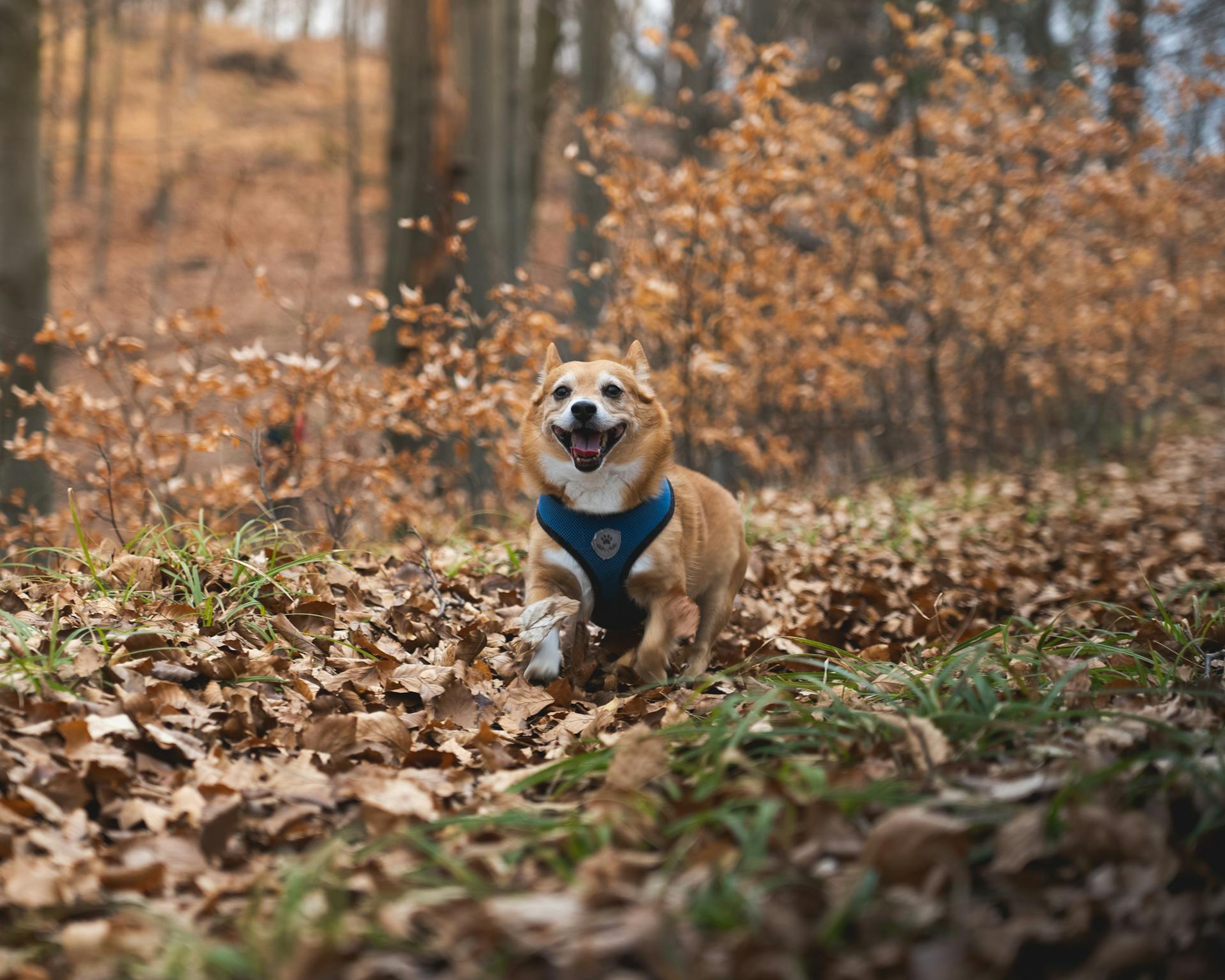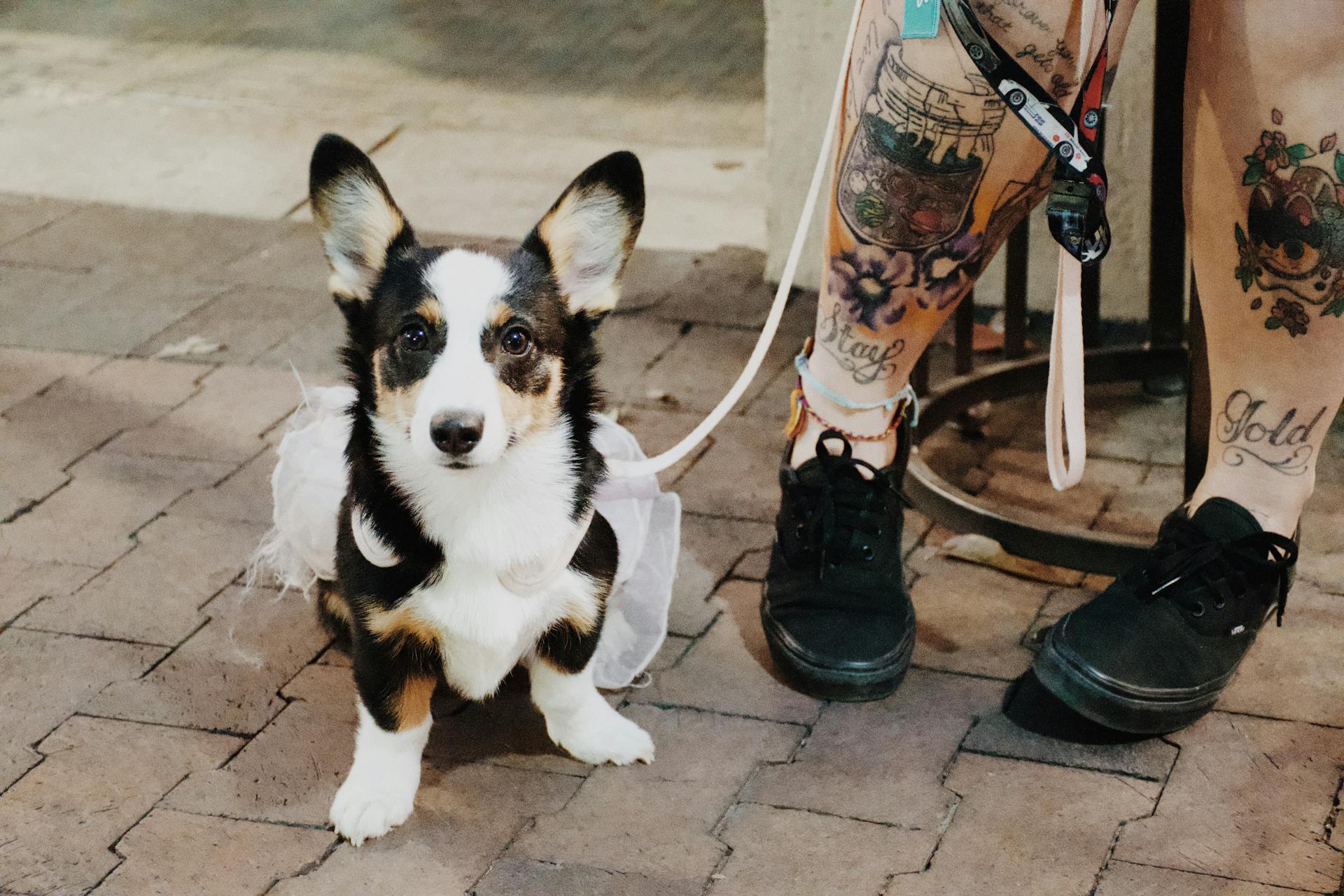
Welcoming a short-haired Pembroke Welsh Corgi into your family is a big decision, and it's essential to be prepared for the responsibilities that come with it.
Short-haired Pembroke Welsh Corgis are generally a healthy breed, but like all dogs, they can be prone to certain health issues. According to the breed's average lifespan, they can live up to 12-14 years with proper care.
One of the key factors in ensuring your Corgi lives a long and healthy life is regular exercise. Aim for at least 30 minutes of physical activity per day, including walks and playtime.
With their short coats, short-haired Pembroke Welsh Corgis require less grooming than their long-haired counterparts, but they still need regular nail trimming and ear cleaning to stay clean and comfortable.
Expand your knowledge: Healthy Bull Terrier
Pet Care
Brushing your short-haired Pembroke Welsh Corgi weekly with a rubber curry brush is a must to remove dead hair from its fur.
It's essential to brush for 10 minute sessions to fully remove loose hair, which will help keep shedding at a minimum.
Their coats are weather-resistant, but they still need regular nail trimming every 2 to 3 weeks to prevent tears and overgrowth.
Daily exercise is crucial to keep your Pembroke Welsh Corgi active and prevent obesity.
They're not a drooling breed, but regular brushing of their teeth, at least weekly, is required to maintain oral health.
This breed can adapt to living in the country or the city, but they thrive when they're part of the family and receive plenty of attention.
They're not a good fit for homes with high furniture, as their short legs and long backs make them prone to fractures from jumping up or down.
Health and Genetics
If you're considering bringing a short-haired Pembroke Welsh Corgi into your family, it's essential to understand the potential genetic health conditions they may be prone to.
Chondrodystrophy (CDDY) is a skeletal disorder that can cause shortened limbs and abnormal degeneration of spinal discs, leading to intervertebral disc disease (IVDD) and disc herniation.
Degenerative Myelopathy (DM) is a neurological disorder that typically affects senior dogs, causing loss of hind limb coordination and eventual weakness.
Exercise-Induced Collapse (EIC) is a neuromuscular disorder that can cause incoordination and weakness after periods of strenuous exercise.
Some of the genetic health conditions that can affect Pembroke Welsh Corgis include:
Knowing about these potential conditions can help you plan for your dog's lifelong care and work with your veterinarian to prevent or manage any issues that may arise.
Genetic Health Conditions
Pembroke Welsh Corgis are prone to several genetic health conditions that can affect their quality of life. Chondrodystrophy (CDDY) is a skeletal disorder that can cause shortened limbs and abnormal early degeneration of the spinal discs.
Degenerative Myelopathy (DM) is a neurological disorder that usually affects dogs in their senior years, causing loss of hind limb coordination and eventual weakness. This condition can progress rapidly, making it essential to monitor your dog's behavior closely.
Exercise-Induced Collapse (EIC) is a neuromuscular disorder that can cause incoordination and weakness after periods of strenuous exercise. This can be a concern for active Pembroke Welsh Corgi owners who enjoy taking their dogs on long walks or engaging in playtime.
Some Pembroke Welsh Corgis may be at risk for vision loss due to Rod-Cone Dysplasia 3 (rcd3), an eye disorder affecting the development of retinal photoreceptors. This condition can significantly impact your dog's quality of life.
Von Willebrand's Disease (vWD) Type 1 is a blood clotting disorder that can cause mild bleeding tendencies, although some affected dogs may experience more severe symptoms. Regular veterinary check-ups can help monitor the severity of this condition.
Here are some of the genetic health conditions that can affect Pembroke Welsh Corgis:
- Chondrodystrophy (CDDY)
- Degenerative Myelopathy (DM)
- Exercise-Induced Collapse (EIC)
- Rod-Cone Dysplasia 3 (rcd3)
- Von Willebrand's Disease (vWD) Type 1
Life Span
The life span of your Pembroke Welsh Corgi is a pretty significant factor to consider. The average life span of the Pembroke Welsh Corgi is 12 to 15 years. This means you'll have a good chunk of time to enjoy their playful and loyal company. With proper care and attention, many Pembroke Welsh Corgis have been known to live up to the upper end of this range.
Explore further: Miniature Bull Terrier Life Span
Training and Behavior
Pembroke Welsh Corgis are easy and fun to train, responding quickly to lessons and retaining them well.
Intelligence is a hallmark of this breed, but they also have a stubborn streak, making consistent training a must.
Positive reinforcement training is key, focusing on rewards rather than harsh methods to bring out the best in your Corgi.
Socialization is essential, starting from puppyhood and continuing throughout their lives, to help them engage with a wide range of people, pets, and places.
These dogs love spending time with their owners and see training as a bonding experience, making it a great way to strengthen your relationship.
Regular socialization is crucial to prevent unwanted behaviors that can arise from boredom or excess energy.
Their intelligence means they can pick up dog training quickly, but it also means they need mental stimulation to prevent herding instincts from taking over.
Providing enough exercise and keeping their minds engaged are essential to prevent unwanted behaviors, such as nipping or barking.
By using positive reinforcement training and providing regular socialization, you can help your Pembroke Welsh Corgi become a well-behaved and loving companion.
Exercise and Enrichment
Pembroke Welsh Corgis are highly energetic dogs that require regular exercise to stay happy and healthy. They were bred to run and herd all day, even with their short legs, so they need plenty of physical activity to keep them satisfied.
A daily walk or hike is a great way to get your Corgi moving, but it's essential to avoid activities that put their long bodies at risk of back injuries, such as jumping or climbing stairs. They also don't do well in extreme temperatures, so it's best to limit outdoor time in hot or cold weather.
Pembrokes excel at dog sports like agility, obedience, and herding, and they love to participate in activities that challenge their minds as well. Puzzle toys and interactive games are great ways to keep their brains engaged and prevent unwanted behaviors.
Here are some activities that are perfect for short-haired Pembroke Welsh Corgis:
- Agility
- Rally Obedience
- Herding
- Treibball
- Search and Rescue
- Therapy Work
These activities not only provide exercise and mental stimulation but also give your Corgi a sense of purpose and fulfillment. By engaging your dog in these activities, you'll be helping them live their best life and strengthening your bond with them.
Temperament and Relationships
The Pembroke Welsh Corgi is a people-oriented breed that thrives on interaction with its family. They love to be around people and enjoy keeping their brains occupied.
As a companion, the Pembroke Welsh Corgi is protective of its family and will alert them to any strangers or dangers. They can be cautious around strangers and require early training to know when to accept new people.
The Pembroke Welsh Corgi is best suited for families with children who know how to treat them gently. With proper training, they can get along well with other dogs and pets.
Despite their small size, Pembroke Welsh Corgis are active, alert, and intelligent dogs. They have a strong work ethic and enjoy remaining busy, which is a testament to their original function as herders.
Pembroke Welsh Corgis love to work and love their families, making them loyal pets and excellent companions. They also have a reputation as good watchdogs due to their big bark and alert nature.
A different take: Welsh Corgi

Socialization as a puppy is crucial for the Pembroke Welsh Corgi, as they tend to be more sociable than other breeds. Proper exposure to new sights, sounds, people, dogs, and other animals will help develop their socialization skills.
With their sturdy build, Pembroke Welsh Corgis can handle rough play with children, but it's essential to supervise interactions and provide a safe space for the dog to retreat to when needed.
Physical Characteristics
Pembroke Welsh Corgis are low-set dogs that are much longer than tall, with a firm and level topline, deep chest, and strong, flexible hindquarters.
Their ears are firm and erect, tapering to a slightly rounded point, and their oval, medium-sized eyes convey an intelligent, interested expression.
These dogs have a unique appearance, with a fox-like face and large ears, giving them a distinctive look.
Pembroke Welsh Corgis are often referred to as "loaves of bread" due to their short legs and long, sturdy body, weighing between 20 and 30 pounds and standing between 10 and 15 inches tall.
Related reading: Why Do Corgis Have Short Legs
They have a double-coated breed, with a short, thick, weather-resistant undercoat and a longer, coarse outer coat that lies flat.
Their coats can vary in length, but they typically have longer hair around their necks, chests, and shoulders, as well as on the back of their forelegs and underparts.
Pembroke Welsh Corgis come in several colors, including red, sable, fawn, black, and tan with or without white markings.
Here are the acceptable colors for Pembroke Welsh Corgis:
- Red
- Sable
- Fawn
- Black
- Tan with or without white markings
Frequently Asked Questions
Is Pembroke Welsh Corgi a good dog?
The Pembroke Welsh Corgi is a popular and affectionate breed, making them a great companion for many families. With their strong and athletic nature, they are well-suited for active households.
Featured Images: pexels.com


